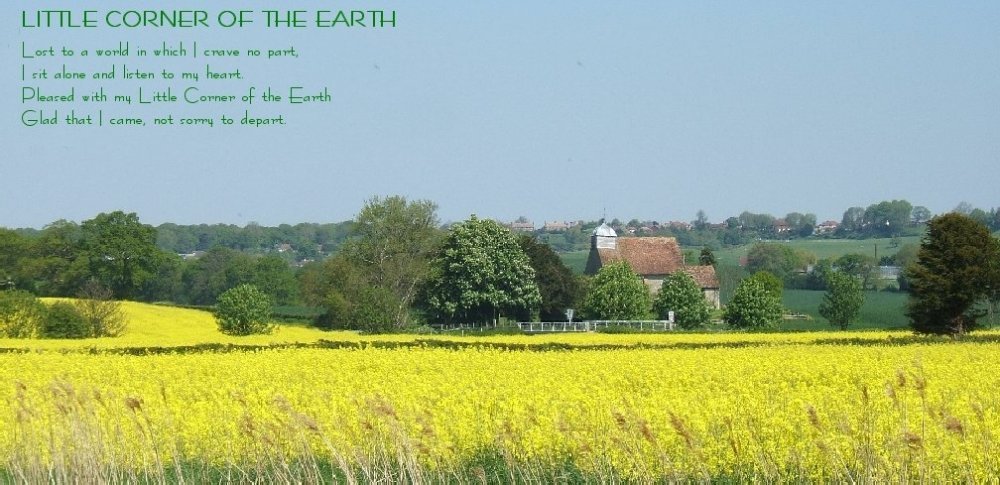My cycle rides take me through the tranquil fields and under the vast skies of Romney Marsh in Kent. But in 1940 it would have been a very different scene. Air war was being waged here and as I turn a corner ahead I can see a lonely roadside monument.
Arriving at the corner one sees it is a grave, but a grave without a body. The remains of Pilot Officer Arthur William Clarke lie still within his Hurricane fighter nearby - embraced by Mother Earth, 30 feet beneath the peaceful fields of Romney Marsh, but by no means forgotten. Whenever I pass I will stop for a moment and there are always fresh flowers on the monument.
The story behind this little corner of the earth is poignantly told in detail here. Please do Arthur the honour of reading it.
"Never in the field of human conflict was so much owed by so many to so few"
The above link is a fitting ending to this post and is worth watching to the end.
The above link is a fitting ending to this post and is worth watching to the end.





13 comments:
I think of my own father, shot down over Denmark. He survived, but only just. I can't get my head around the consequences of seemingly arbitrary events with vanishingly small probabilities. How close was Arthur to baling out successfully? How fragile are the chains of events that mean I'm here but Arthur's descendants are not?
And who knows — perhaps Arthur's sacrifice is part of the chain of events that means I'm here now?
20 years old...
P'Pete:
Your Father's war story would bear the re-telling. Shot down over Denmark - was he taken prisoner?
As to those "chains of events" - they bifurcate every microsecond, each leading to countless others, in turn dividing...impossible to understand.
I was two years old when Arthur died, living about 30 miles away, closer to London. Who knows? Perhaps his actions that day mean that I am still here.
HHnB:
Indeed, just 20 years old. I have found a photo of Arthur which I have now added to the post.
I have recently read "First Light", by Geoffrey Wellum who was 17 when enlisting and 18 when he engaged in air battle - the youngest pilot at that time. Very moving and involving, it is the definitive account of flying during the Battle of Britain.
I have just re-watched Michael Palin's programme about the soldiers who were killed after the 1914-18 armistice was signed - mainly due to the blockheadedness of their generals. Inevitably there were scenes of huge cemeteries, a reminder of one of the greatest tragedies of WW1 - deaths lost their individuality to those looking on, then and now, and this is only retrieved by the painstaking recording of names on the tombstones. It may be some comfort that Arthur's death was separate from other deaths and this has allowed a poignantly individual memorial. Some may think this unfair to the thousands who died in WW1 trenches and who risk being gathered together as a statistic but I think a wider need is served here. We need as many memorials as are appropriate. And in as many places. The cemeteries in France and Belgium regularly serve the French and the Belgians, this one serves Brits. And its very loneliness probably brings home the message in a sharper, more insistent way. On everyone's behalf.
BB:
I think your penultimate sentence goes right to the heart of this.
I echo HHnB with the simple statement of 'twenty years old'.
I'm glad that he has fresh flowers, but they are no substitute for life.
Thank you for this post, Avus. I followed your links and had a good cry for all the men and women lost to war. A lovely, thought-provoking post, more direct than all the parades that might take place today.
I find Remembrance Day in England almost unbearably poignant. Every small village seems to have its own cross or memorial. At my daughter's school, they read out tributes to every "old boy" who died in the world wars.
Very moving. Thanks for the opportunity to read about another of the young men who gave their lives ' so we could have ours'. (Just last night I was talking with my daughter in law who had just found out from her mother that her great-great-grandmother came out to NZ from Kent. "Where is Kent?" she'd asked me. Now I can tell her even more about it).
Kay:
I wonder if you know exactly where in Kent the g.g.grandmother came from? I might be able to fill in even more detail for you.
Lovely tribute and post highlighting a special part of Romney Marsh.
For anyone interested, the memorial can be seen on Google maps at http://maps.google.co.uk/maps?q=TN29+0DL&hl=en&ll=51.033873,0.938611&spn=0.000027,0.017424&sll=53.800651,-4.064941&sspn=16.837555,35.683594&hnear=Newchurch+TN29+0DL,+United+Kingdom&t=h&layer=c&cbll=51.033873,0.938611&panoid=iUKk5mZUZykDZFCRn_qD1A&cbp=12,210.77,,1,13.67&z=16
Arthur is my great uncle. My grandparents kept his picture on the wall until their death a few years ago. He is always remembered in our family and I will make sure my son knows his history as well.
I found this memorial while cycling around Romney Marsh, and it had fresh flowers and is definitely being cared for by the locals. I'll be sure to remember him whenever the Battle of Britain is mentioned. It is indeed a beautiful and peaceful spot, and I'm glad he is not forgotten.
Post a Comment